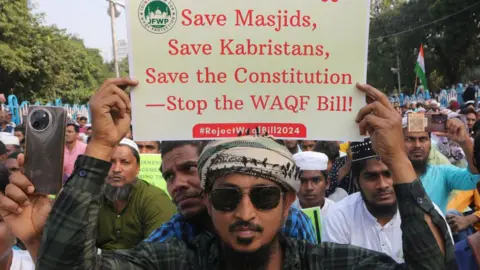BBC News, Delhi
 Getty Images
Getty ImagesIndian lawmakers are debating a controversial bill that seeks to change how properties worth billions of dollars donated by Indian Muslims over centuries are governed.
Prime Minister Narendra Modi’s government has presented the Waqf (Amendment) Bill, 2024 – which brings in dozens of amendments to an existing law – in the lower house of parliament, where it is being discussed.
The government says the bill will introduce transparency into the management of waqf, as the properties are called.
But opposition parties and Muslim groups have opposed it, calling it an attempt to weaken the constitutional rights of India’s largest religious minority.
The bill was first tabled in parliament in August last year but was sent to a joint parliamentary committee (JPC) after an outcry from opposition members.
Reports say the version presented on Wednesday by federal Minority Affairs Minister Kiren Rijiju incorporates 25 changes suggested by the sharply divided committee that included opposition members.
The bill will be passed in the Lok Sabha, or lower house, if it gets more votes than the halfway mark of 272.
Most opposition parties including the Congress are expected to vote against the bill. But the coalition led by Modi’s Bharatiya Janata Party (BJP) is expected to have enough numbers to get it passed, barring a major surprise. It will then be sent to the Rajya Sabha, or upper house, for discussion and passage.
If it is passed by both houses of parliament, it will be sent to President Droupadi Murmu for her assent before it becomes law.
Mallikarjun Kharge, Congress MP and leader of the opposition in the Rajya Sabha, said the opposition was united and would work to defeat “the unconstitutional and divisive agenda of the Modi government on the Waqf Amendment Bill”.
Muslim groups have argued that the bill “aims to weaken the waqf laws and pave the way for the seizure and destruction of waqf properties”.
Moving the bill in parliament on Wednesday, Rijiju accused the opposition of spreading rumours that the bill would take away the rights of Muslims.
“The Waqf (Amendment) Bill that we have introduced includes several recommendations from the JPC, which we have accepted and incorporated into this bill,” he said.
But opposition members have alleged that the JPC accepted the changes suggested by the BJP and its allies while rejecting all amendments they proposed.
What is the bill about?
The waqf properties, which include mosques, madrassas, shelter homes and thousands of acres of land donated by Muslims, are managed by boards. Some of these properties are vacant while others have been encroached upon.
In Islamic tradition, a waqf is a charitable or religious donation made by Muslims for the benefit of the community. Such properties cannot be sold or used for any other purpose – which implies that waqf properties belong to God.
The government says that the waqf boards are among India’s largest landholders. There are at least 872,351 waqf properties across India, spanning more than 940,000 acres, with an estimated value of 1.2 trillion rupees ($14.22bn; £11.26bn).
A major criticism from opponents of the bill is that it grants the government undue power to regulate the management of these endowments and determine whether a property qualifies as “waqf”.
The bill also proposes the induction of two non-Muslim members on the waqf boards which oversee these properties. Critics have opposed this provision, arguing that most religious institutions run by non-Muslims do not permit followers of other faiths in their administration.
Follow BBC News India on Instagram, YouTube, X and Facebook
